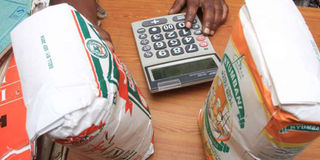Cost of flour to go up as millers boycott stock

A shopkeeper calculates the price of two packets of maize flour for a customer in a Nyeri shop on May 21, 2014. The cost of maize flour is expected to rise. PHOTO | JOSEPH KANYI | NATION MEDIA GROUP
What you need to know:
- According to the millers, the maize stock from NCPB depots in western Kenya has a brown coloration and is prone to attack by weevils.
- Mr Newton Terer, the NCPB managing director, acknowledged that his team had received complaints from millers but said that the issue was being addressed.
Millers have been avoiding maize from the National Cereals and Produce Board (NCPB), claiming that it is unfit for human consumption.
Instead, some of them have opted to import more expensive grain from Tanzania, effectively pushing up the cost of maize meal, a staple food in most of the country.
Others have been buying the produce directly from farmers, especially in the western parts of Kenya and the Rift Valley.
As a result of the boycott by the private millers, the cereals board has been experiencing difficulties selling its “dead stock”.
According to the millers, the maize stock from the NCPB depots in western Kenya has a brown coloration and is prone to attack by weevils.
This, they said, was an indication that the maize had overstayed in the silos.
“I purchased 2,500 bags of maize from the NCPB stores in Eldoret and Ainabkoi depots and it proved to be of low quality,” said a miller who requested anonymity for fear of losing clients. “The flour had a pungent smell, forcing me to abandon buying maize from the board.”
Millers interviewed named the Eldoret, Moi’s Bridge and Ainabkoi silos as among those affected.
Mr Newton Terer, the NCPB managing director, acknowledged that his team had received complaints from millers but said the issue was being addressed.
“Millers always want the latest maize stocks but it doesn’t mean that what we are selling to them is bad stock. We are, however, liaising with our trustees at SGR (Strategic Grain Reserve) to deplete the existing stock in preparation for the next purchase,” Mr Terer said in a telephone interview with the Nation.
He disclosed that the board had more than 2.2 million bags of maize in the strategic reserve, enough to feed the country until the next harvest.
The NCPB has been holding maize for up to five years and there are claims that some of it goes bad before it is distributed.
“In an ideal situation, the maize stocks can be stored for up to six years when the moisture content is low and will remain fit for human consumption,” said a reliable source at the board.
MILLERS FAULTED
In some cases, however, Grade 4 maize becomes unfit for consumption — even as animal feed — when it stays for too long in the stores.
The millers' claims that NCPB stores in the North Rift are stocked with bad maize comes at a time when maize flour prices have be going up. The increase has been attributed to a shortage of the grain.
A spot check by the Nation in the region revealed that there was a low maize supply at most outlets, a shortage that had pushed prices higher, making ugali — a staple food — more costly for poor families.
Imported maize is sold at between Sh2,800 and Sh3,200 for a bag of 90 kilos, compared with the Sh2,300 offered by the cereals board.
According to Director of Crops Johnston Irungu, the country has 10 million bags of maize, enough to last three months before the next harvest.
On Friday, Deputy President William Ruto accused millers of creating a false maize shortage as an excuse for raising flour prices.
Speaking in Kirinyaga County after opening a tea factory in Gichugu, Mr Ruto warned millers to stop acting like cartels.
He said the cereals board stores had 10 million bags of maize and that this was enough to feed the country.
A day earlier, a millers’ lobby group had said its members had reduced production to 39 per cent of their capacity because of a maize shortage. This, they said, had increased their production costs.
The chairman of the Cereal Millers Association, Nick Hutchinson, said maize supply had remained unstable causing flour prices to go up by about Sh15 per packet in the past three months.
He said members currently hold just 500,000 bags, enough to last seven days. As a result, he said, they were banking on the new harvest in Tanzania.
Additional reports by Nicholas Komu





